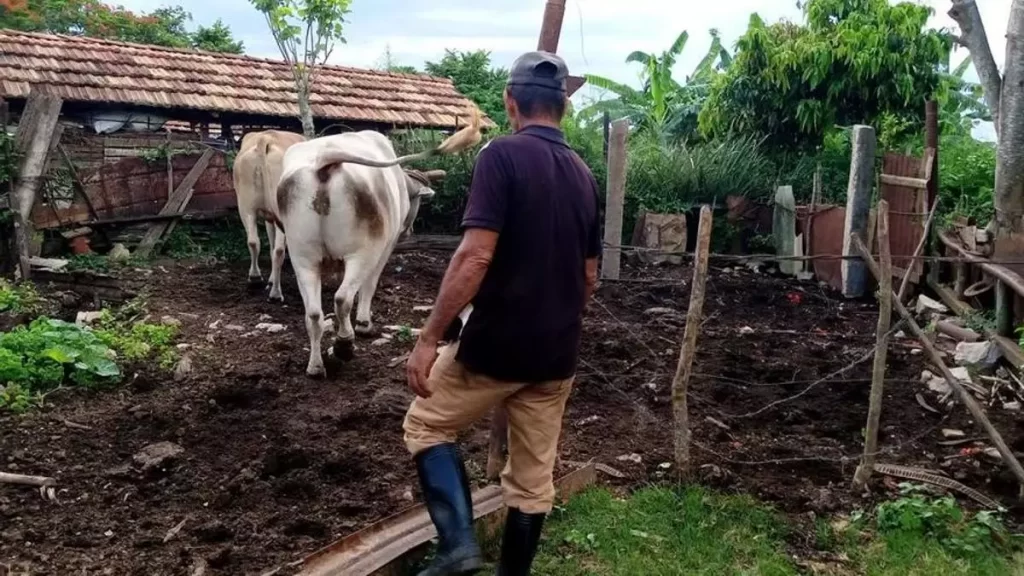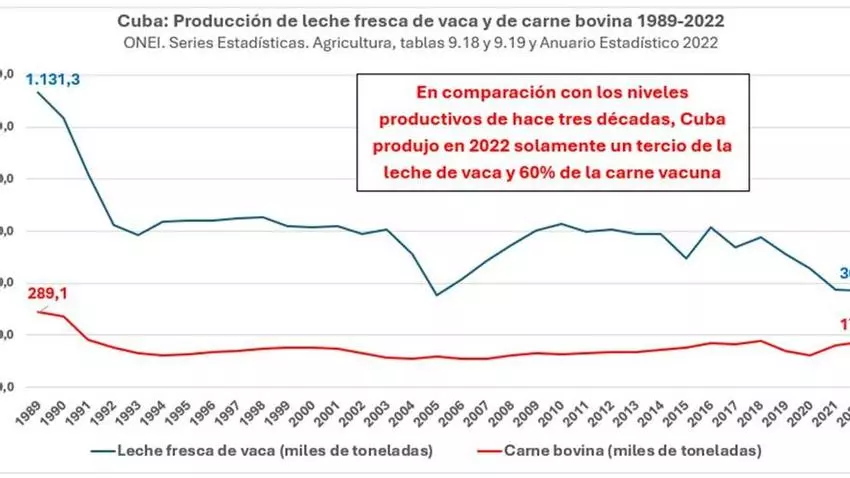The sector’s executives pilfered the information in a television appearance in which they offered “we have to” as the only response to the problems.

![]() 14ymedio, Madrid, May 17, 2024 — The situation of livestock farming was nothing short of a joke, hours after learning that the sector’s products were the ones that rose the most in price last month, when this Thursday’s State TV Roundtable announced that the topic to be discussed In the evening program would be why production is not growing and what is being done to change this. If someone sat down to listen to the answer to these questions, the only thing they found was something similar to Aesop’s fable known as “The Milkmaid’s Tale.”
14ymedio, Madrid, May 17, 2024 — The situation of livestock farming was nothing short of a joke, hours after learning that the sector’s products were the ones that rose the most in price last month, when this Thursday’s State TV Roundtable announced that the topic to be discussed In the evening program would be why production is not growing and what is being done to change this. If someone sat down to listen to the answer to these questions, the only thing they found was something similar to Aesop’s fable known as “The Milkmaid’s Tale.”
When we solve these two problems (food and water) that will be expressed in reproductive health in the livestock and this will give more production,” said Yoandry Beltrán Pérez, vice president of the Livestock Business Group. It was not necessary to think much to get there, the question is how it is going to be resolved and the answer offered by Beltrán and his boss, Alain Rodríguez León, was the usual “we have to.”
“We have to transform the living conditions of the people involved in livestock production,” was the first wish expressed. He was referring to an alleged investment to restore 30 ranchers’ houses this year, although the project covers a total of 155. “We have to promote the planting of cane and protein plants,” he continued, alluding to Fidel Castro “who left us that legacy” thanks to which there are 15 seed farms in different provinces.
“We have to conserve food for dry periods, that is, take advantage of the six rainy months in the country, from May to November
“We have to conserve food for the dry periods, that is, take advantage of the six months that we have rainy weather in the country, from May to November,” he added to the list, which also gained weight with another aspiration, more specific in In this case: “We are trying to change the energy matrix.” This could supply water not only to the dairy farms, but also to provide it in other places where the animals can drink it whenever they want.
The blackouts affect the feeding of livestock, which is why the official expressed a new “we have to,” this time referring to the search for independence of water supply systems. “This cannot be achieved in a day, but it is where we have our sights set.”
While the authorities continue to think about what they and others have to do, the sector has been sinking for more than 30 years. Beltrán himself recognized this when he said that it is the obligation of the group (created as such in 2015) “to stop the decrease in the [number of dairy cows], which has had a decrease since the Special Period,” and “it has not been able to be stopped” The president, Rodríguez León, also admitted the “decrease,” but failed to put figures on it.
They had been left moments before by the economist Pedro Monreal, who warned of the situation on his X account. “They announce the Round Table today with the Cattle Business Group (Gegan) to explain the ‘business structure’, ‘why doesn’t production grow’ and ’what has to be done to transform the situation?’ Before they come out with any story, it is worth looking at one piece of information.” The tweet is accompanied by a graphic that illustrates the debacle.

In 1989, 1,131,300 tons of fresh cow’s milk were produced on the Island, compared to 369,000 tons in 2022, 67% less. When it comes to meat, the drop is less abrupt, but the drama is also evident. It went from 289,100 tons to 172,300, 40% less. In other words, in 2022, 60% of the meat and a third of the cow’s milk that was achieved in the late 90s, when Cuba was still recovering from the Special Period, was produced.
The president of the livestock group, who gave countless figures from the business organization chart, referred to the updating of the livestock registry that is being carried out. To date, he stated, visits have been made to 30,000 ranchers and more than 10,000 illegalities have been detected, although he stressed that the objective is not to penalize anyone, but rather “to have greater control of the number of animals, to know the living conditions of producers, the availability of water, roads and other infrastructure.”
Among the most striking data presented during the program is the low amount of losses reported by the director. At the end of 2023, 20 companies lost 336,188,516,400 pesos, while a profit of 16,431,100 pesos was achieved. As of today, however, only four remain negative, with 5,752,800 pesos. The reason could be in the small real power of the State in the sector, since 85% of the producers are private, as Beltrán Pérez himself indicated. “We must go to each farm and conscientiously enforce what is approved in the Livestock Promotion and Development Law in the country,” he concluded.
85% of the producers are private, as Beltrán Pérez himself indicated. “We must go to each farm and enforce compliance.”
Also participating in the program were Ramón Denis García, General Director of the Research Center for the Animal Improvement of Tropical Livestock (CIMAGT), and César Liván Franco Camacho, General Director of the Venegas Livestock Company, who gave the keys to the success for his farm. Both praised the “historic leader” who, the first to speak described, “had the vision of developing science, coupled with the country’s agricultural development.” It is not exactly the sector to boast about, but the expert boasted of the scientific-technical tasks aimed at changing the situation, apparently without much success in the last 30 years.
Franco Camacho said that bank loans were vital to move the Venegas company forward, with its 22 dairy farms that are supplied with large-capacity tanks. “We have been serious with them in payments and we have no overdue loans. With these credits we also help producers in marketing with the purchase of sweet potatoes and cassava, among others,” he said.
Although he had just found one of the keys to the national economic collapse, not leaving debts, he ended up getting lost again in the discourse that will not fix the sector’s problems. “Livestock must be worked with love (…) we have created a science group in livestock, with people who love it, to search for solutions that can be taken into account towards its development. And since the Comandante [Fidel Castro] dedicated the last years of his life to showing us the way to plant animal food, that is what we work for,” he concluded.
____________
COLLABORATE WITH OUR WORK: The 14ymedio team is committed to practicing serious journalism that reflects Cuba’s reality in all its depth. Thank you for joining us on this long journey. We invite you to continue supporting us by becoming a member of 14ymedio now. Together we can continue transforming journalism in Cuba.
